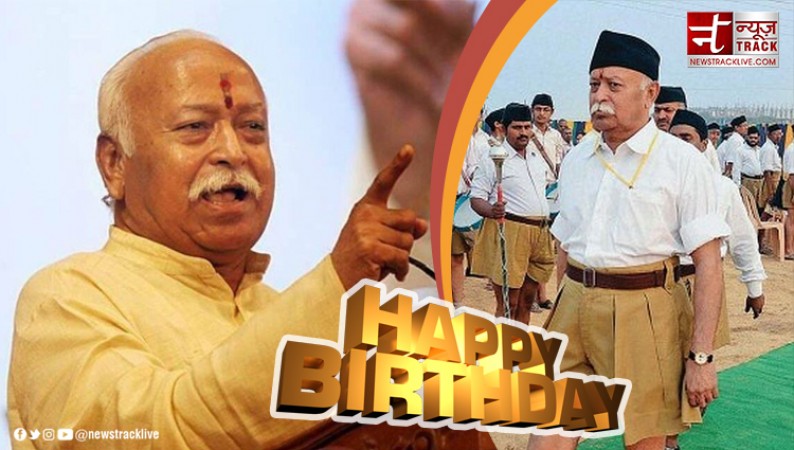
Mohan Madhukarrao Bhagwat, born on September 11, 1950, is a prominent political activist, veterinarian, and the current Sarsanghchalak (chief) of the Rashtriya Swayamsevak Sangh (RSS) in India. His life's journey is a testament to his unwavering commitment to the principles and values of the RSS, and his leadership has left an indelible mark on the socio-political landscape of India.
Early Life and Family Background
Mohan Bhagwat was born into a Marathi Karhade Brahmin family in Chandrapur, a city in the then-Bombay State of India. His family has a long-standing tradition of involvement in the RSS, and his upbringing was deeply rooted in the organization's ethos. His father, Madhukar Rao Bhagwat, was a dedicated RSS activist who served as the Karyavah (secretary) for the Chandrapur zone. Later, he ascended to the position of Prant Pracharak (provincial promoter) for Gujarat, showcasing the family's deep commitment to the RSS cause. Mohan Bhagwat's mother, Malati, was also actively involved in the RSS Women's Wing, emphasizing the organization's role in shaping his early life.
Education and Early Career
Bhagwat pursued his education with dedication and graduated with a degree in Veterinary Sciences and Animal Husbandry from Government Veterinary College in Nagpur, Maharashtra. His education in veterinary sciences not only reflected his intellectual prowess but also laid the foundation for his later role as a Sarsanghchalak, where he would seek to nurture and protect the diverse social fabric of India, much like a veterinarian tends to the health of animals.
After completing his education, Bhagwat's journey took an interesting turn as he decided to join the RSS as a pracharak (full-time worker). This marked the beginning of his lifelong association with the organization, which would eventually lead him to the highest echelons of leadership within the RSS.
Leadership Within the RSS
Over the years, Mohan Bhagwat's dedication, discipline, and leadership skills were recognized within the RSS, and he steadily climbed the organizational hierarchy. He served in various roles, including Prant Pracharak (provincial promoter) and Akhil Bharatiya Sharirik Pramukh (All India Physical Education In-charge). His journey through these roles allowed him to understand the RSS's structure and its immense grassroots influence across India.
In 2009, Bhagwat was chosen as the Sarsanghchalak of the RSS, succeeding K.S. Sudarshan. As the Sarsanghchalak, he became the spiritual and administrative head of the organization, entrusted with the task of furthering its goals and principles.
Vision and Impact
Under Mohan Bhagwat's leadership, the RSS has continued to play a significant role in shaping India's socio-political landscape. His vision for India is one that is deeply rooted in the cultural and spiritual values of the nation, and he has worked tirelessly to promote these values among the youth and society at large.
Bhagwat has emphasized the importance of "Hindutva," a concept that embodies the cultural and spiritual essence of being Hindu, rather than a narrow religious definition. He has stressed the need for social harmony and has advocated for a united and strong India. His leadership has also seen the RSS engage in various social and educational initiatives, including disaster relief, healthcare, and rural development, showcasing the organization's commitment to serving society.
Challenges and Controversies
While Bhagwat's tenure as the Sarsanghchalak has been marked by significant achievements, it has not been without its share of controversies. The RSS, under his leadership, has faced criticism for alleged attempts to influence government policies and for its stance on issues such as religious conversions and cow protection. These controversies have fueled debates about the role of the RSS in shaping India's secular fabric and its impact on minority communities.
Legacy and Future
As Mohan Bhagwat continues to lead the RSS into the 21st century, his legacy as a visionary leader who champions cultural and national pride remains unquestionable. His ability to mobilize and inspire millions of RSS volunteers across India underscores the enduring influence of the organization he leads.
The future of India under Bhagwat's leadership promises to be one that is firmly rooted in the nation's cultural and spiritual heritage. His unwavering commitment to these ideals will undoubtedly shape the trajectory of the RSS and, by extension, India itself for years to come. As India navigates the complexities of a diverse society and a rapidly changing world, Mohan Bhagwat's leadership provides a guiding light for many who seek to uphold the values of unity, diversity, and cultural heritage in the nation.